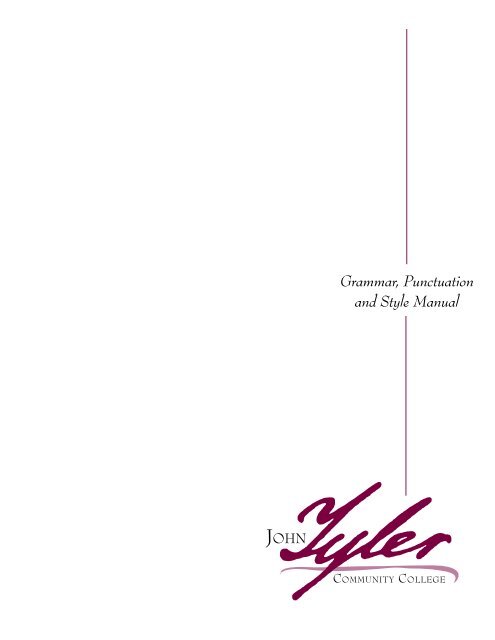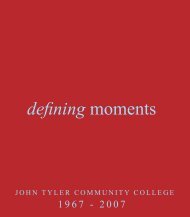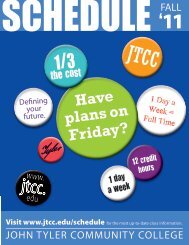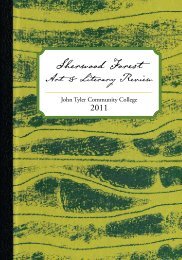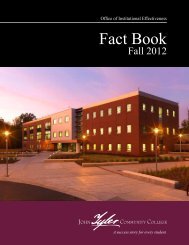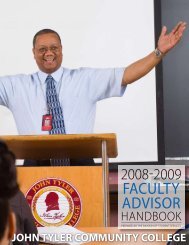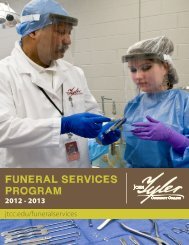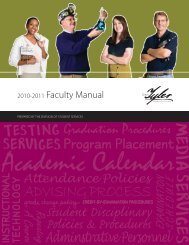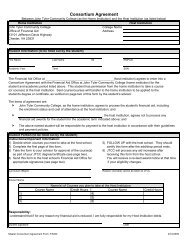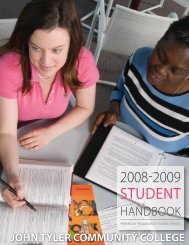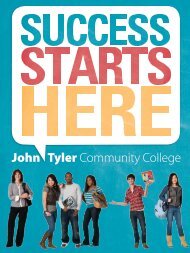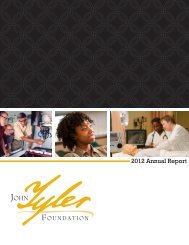Grammar, Punctuation And Style Manual - John Tyler Community ...
Grammar, Punctuation And Style Manual - John Tyler Community ...
Grammar, Punctuation And Style Manual - John Tyler Community ...
Create successful ePaper yourself
Turn your PDF publications into a flip-book with our unique Google optimized e-Paper software.
<strong>Grammar</strong>, <strong>Punctuation</strong>and <strong>Style</strong> <strong>Manual</strong>
Academic DegreesIn general usage, spell out degrees in lowercase letters. Use an apostrophe when writing bachelor'sdegree or master's degree but not when writing associate degree. There is no possessive when writingbachelor of (degree name), master of (degree name), associate of (degree name). For a doctorate, usedoctorate in (name of field). Do not write associate in (degree name). When listing certificates andcareer studies certificates, use “in” when referencing the program of study.Examples:<strong>John</strong> Smith earned an associate of applied arts degree in visual arts with a studiospecialization.Jane Doe earned a certificate in homeland security.Use degree abbreviations only after the full name of a person. Use periods with academic degrees.Examples: Mike Jones, M.F.A., Sandy Teller, B.A., Dorothy Sandston, Ph.D.Some commonly used degree abbreviations:Associate of Applied Arts – A.A.A.Associate of Applied Science – A.A.S.Bachelor of Arts – B.A.Bachelor of Science – B.S.Doctor of Arts – D.A.Doctorate of Education – Ed.D.Doctorate of Philosophy – Ph.D.Master of Arts – M.A.Master of Education – M.Ed.Master of Fine Arts – M.F.A.Master of Science – M.S.Academic Divisions, Departments and OfficesCapitalize division and office names. Use the guidelines below:Divisions and OfficesAdmissions and RecordsBookstoreBusiness OfficeCollege Relations<strong>Community</strong> College Workforce AllianceCounseling Center – ChesterCounseling Center – MidlothianDepartment of Extended LearningDepartment of Learning ResourcesDivision of Arts, Humanities and Social SciencesDivision of Engineering, Business and Public ServicesDivision of Health SciencesRev. 3/2010 3
Division of Mathematics, Natural and Behavioral SciencesDivision of Student ServicesFacilities OperationsFinancial AidHuman ResourcesInformation CenterInformation Technology Services Center (ITSC on second reference)Institutional EffectivenessInstructional Technology<strong>John</strong> <strong>Tyler</strong> <strong>Community</strong> College FoundationLibrary – ChesterLibrary – MidlothianOffice of the PresidentOffice of the Vice President of Academic and Student ServicesOffice of the Vice President of Finance and AdministrationOld Dominion University TeletechnetOutreach ServicesSecurity ServicesStudent ActivitiesStudent Success Center – ChesterStudent Success Center – MidlothianTesting ServicesVeterans AffairsAcademic Departments (faculty only)Department of Allied Health ProgramsDepartment of Behavioral SciencesDepartment of Business and AccountingDepartment of EngineeringDepartment of EnglishDepartment of Funeral ServicesDepartment of Humanities and Social SciencesDepartment of Industrial TechnologyDepartment of Information TechnologyDepartment of MathematicsDepartment of Natural SciencesDepartment of NursingDepartment of Public ServicesDepartment of Visual and Performing ArtsAcademic ProgramsUppercase program names.Examples:Nursing ProgramRev. 3/2010 4
Liberal Arts ProgramAdjunct Faculty MemberUse the term adjunct faculty member instead of adjunct professor or adjunct instructor.AdministrationLowercase in all uses.Affect/EffectAffect, as a verb, means to influence: The game will affect the standings.Affect, as a noun, is best avoided. It occasionally is used in psychology to describe an emotion.Effect, as a verb, means to cause: He will effect many changes in the company.Effect, as a noun, means the result: He miscalculated the effect of his actions.AgesAlways use figures for people and animals but not for inanimates.Examples:The girl is 15 years old.The law is eight years old.Use hyphens for ages expressed as adjectives before a noun or as substitutes for a noun.Example:A 5‐year‐old boy won the prize.Do not use an apostrophe when writing decades.Example:The woman is in her 30s.Alumna, Alumnae, Alumni, Alumnus• alumna ‐ singular, female• alumnae ‐ plural, women only• alumni ‐ plural, men only or men and women• alumnus ‐ singular, male• alum‐singular, male or female; appropriate only in informal contextsRev. 3/2010 5
AnnualAn event cannot be described as annual until it has been held for at least two successive years. Do notuse the term first annual.Anybody, Any Body, Anyone, Any OneOne word for an indefinite reference.Example:Anyone can do that.Two words when the emphasis is on singling out one element of a group.Example:Any one of them may speak up.BlackboardAn online learning tool used to deliver distance education courses and enhance traditional classroomcourses.Capitalize in all instances. Always write as one word.Bulleted ListsThe following guidelines should be followed when using bulleted lists:Capitalize the first word of full sentences.Example:Competition Requirements• Entrants must be 18 years of age or older.• All work submitted must be original.• An application must be completed.Capitalize the first word of short lists.ExampleThe College offers flexible scheduling options such as:• Evening classes• Weekend classes• Hybrid courses• Online coursesRev. 3/2010 6
Lowercase the first word of lists beginning with a verb.Example:Increase scholarship applications by:• e‐mailing students• mailing postcards to students and their families• advertising scholarships on the College’s homepageDo not use bullet points unless there are at least two items listed.Campuses, Locations and BuildingsBelow is a list of the proper names of the College’s locations and buildings:LocationsChester CampusMidlothian CampusNursing Education Center<strong>Community</strong> College Workforce Alliance at Featherstone Professional CenterBuildingsAcademic BuildingAdministration BuildingBird HallGodwin HallGoyne HallMoyar HallNicholas Student CenterPhysical Plant – ChesterPhysical Plant – MidlothianScience Building• The word campus always should be capitalized when writing Chester Campus or MidlothianCampus. Lowercase the word campus when used by itself. Lowercase the word campuses whenreferring to the Chester and Midlothian campuses.ExamplesThe performance will take place at the Chester Campus.Students visited the campus.Classes are offered at the Chester and Midlothian campuses.• The College has two campuses, the Chester Campus and the Midlothian Campus. No otherCollege facility should be identified as a campus.Rev. 3/2010 7
CampuswideWrite as one word. Also citywide, countywide, statewide, nationwide and worldwide.Cannot, Can notBoth cannot and can not are acceptable, but the first is much more common. You would use can notwhen the “not” forms part of another construction, such as “not only.”ChairCapitalize as a formal title if used before a person’s name. Lowercase in all other cases. Avoid genderspecific nouns such as chairman and chairwoman.Example:College Board Chair <strong>John</strong> Doe called for a vote.<strong>John</strong> Doe is chair of the committee.Child CareWrite as two words.Classes/CoursesLowercase when referring to classes and courses. Uppercase if referring to the specific name of a classor if the class uses a proper noun or numeral.Examples:I took a history class and a math class.I took History 101 and Math 102.ClassroomWrite as one word.CollegeCapitalize in all references made to <strong>John</strong> <strong>Tyler</strong> <strong>Community</strong> College, lowercase elsewhere.Examples:The College will be closed on July 4.Rev. 3/2010 8
<strong>John</strong> <strong>Tyler</strong> <strong>Community</strong> College is working with another college to develop new distanceeducation programs.College BoardThe College Board should be listed as the <strong>John</strong> <strong>Tyler</strong> <strong>Community</strong> College Board on first reference.College Board or the board should be used in subsequent references. If using the abbreviation JTCC,write JTCC Board. Always capitalize College Board. Always lowercase the board or board member. IfJTCC Board is used, the first reference should be written as follows:<strong>John</strong> <strong>Tyler</strong> <strong>Community</strong> College (JTCC) BoardCollege NameOn first reference, the College always should be identified as <strong>John</strong> <strong>Tyler</strong> <strong>Community</strong> College. To avoidrepetition, <strong>John</strong> <strong>Tyler</strong>, the College, or JTCC may be used in subsequent references. Because of theprominence of the word <strong>Tyler</strong> in the College logo, <strong>John</strong> <strong>Tyler</strong> is preferred over JTCC. Capitalize Collegewhen used to refer specifically to <strong>John</strong> <strong>Tyler</strong> <strong>Community</strong> College. Lowercase the word college in allother references. JT should not be used.If JTCC is used, the first reference should be written as follows:<strong>John</strong> <strong>Tyler</strong> <strong>Community</strong> College (JTCC)Comma (,)The following guidelines address some of the most frequent questions about the use of commas.• Use commas to separate elements in a series, but do not put a comma before the conjunctionin a simple series. However, if the sentence includes a longer series, a comma may be usedbefore the conjunction to avoid confusion.Examples:The student took math, English and history.The College offers options that allow students to transfer to a four‐year institution,switch careers, improve their job skills, and enter the workforce.• Use commas before conjunctions such as “and,” “but” or “for” if the conjunction links twoclauses that could stand alone as separate sentences.Example:We visited Washington, and our senator greeted us personally.CommencementCapitalize when used as the formal name of a ceremony. Lowercase in all other uses.Rev. 3/2010 9
Commonwealth of VirginiaVirginia is a commonwealth. Capitalize Commonwealth when specifically referencing Virginia.Examples:The College is located in the Commonwealth of Virginia.The Commonwealth is preparing for hurricane evacuations from Norfolk.<strong>Community</strong> College Workforce AllianceThe <strong>Community</strong> College Workforce Alliance, a partnership between <strong>John</strong> <strong>Tyler</strong> <strong>Community</strong> College andJ. Sargeant Reynolds <strong>Community</strong> College, is dedicated to providing world‐class workforce developmenttraining and services to members of the public and private sector in Virginia.<strong>Community</strong> College Workforce Alliance should be used on first reference. On second reference CCWAmay be used. If CCWA is used, the first reference should read as follows:<strong>Community</strong> College Workforce Alliance (CCWA)CorequisiteWrite as one word.CourseworkWrite as one word.Courtesy TitlesRefer to men and women by their first and last name. Use the courtesy titles Mr., Miss, Ms. or Mrs.only in direct quotations, invitations or programs. Also see Names of People.Curriculum, Curricula and CurricularThe word curriculum is a singular noun. Curricula is a plural noun. Curricular is an adjective.Examples:Students enrolled in the nursing curriculum must take part in clinicals.She is enrolled in both the human services and child care curricula.The deans are meeting to discuss four curricular programs.Rev. 3/2010 10
DatesNo comma is needed when writing the month and year.Example:The catalog will be released in August 2009 and ready for distribution during the fallsemester.Always use Arabic figures, without st, nd, rd or th.Examples:Incorrect – Registration will take place on October 10 th .Correct – Registration will take place on October 10, 2009.When referencing periods of years, do not use an apostrophe with the “s.”Examples:Incorrect – He grew up in the 70’s.Correct – He grew up in the 70s.Repeat only the final two digits of the second number when writing inclusive years.Example:The 2007‐08 academic yearUse a hyphen to separate dates that are used to indicate a timeframe.Example:Fall registration is November 12 – 30, 2009.Capitalize the names of months in all uses.When abbreviating months, use the following abbreviations: Jan., Feb., Mar., Apr., Aug., Sept., Oct.,Nov. and Dec. Do not abbreviate May, June or July.Spell out the month when using alone or with a year.Dean's ListThe dean’s list is an academic honor. To be named to the dean’s list a student must be full‐time andhave earned a minimum 3.2 grade point average for the semester.Lowercase in all uses.ExampleHe is on the dean’s list.Rev. 3/2010 11
Doctor/Dr.Use Dr. in first reference as a formal title before the name. Do not use the title in subsequentreferences (use the person’s last name only). Do not use the degree abbreviation after a person’sname if Dr. appears before the name.Examples:Correct: Dr. <strong>John</strong> DoeCorrect: <strong>John</strong> Doe, Ph.D.Incorrect: Dr. <strong>John</strong> Doe, Ph.D.E‐mailWrite as e‐mail. Do not use email or E‐Mail.Every day, EverydayEvery day is an adverb.Example:She goes to work every day.Everyday is an adjective.Example:He wears everyday shoes.FederalCapitalize federal as part of corporate or government bodies that use the word as part of a formalname. Lowercase federal when used as an adjective.FTEFTE stands for full‐time equivalent. Sum total of all credit hours, annually, divided by a full‐timestudent’s course load (30 credits). In the first reference write out full‐time equivalent. Subsequentreferences may use FTE. Full‐time equivalent student (FTES) may also be used.Rev. 3/2010 12
General AssemblyCapitalize when preceded by the state name. Retain capitalization when the state name is dropped butwhen the reference is specifically to that state’s legislature. If using the word assembly only, do notcapitalize.GovernorCapitalize and abbreviate as Gov. or Govs. when used as a formal title before one or more names inregular text. Capitalize and spell out when used as a formal title before one or more names in a directquotation. Lowercase and spell out in all other uses.Grade Point AverageWrite grade point average (in lower case) for the first reference. In subsequent references, GPA may beused. When using GPA, the first reference should be written as follows:Grade point average (GPA)Example:He earned a 3.5 grade point average (GPA) in biology his first year and a 4.0 GPA inbiology his second year.GradesUse quotation marks around a letter grade in a sentence.ExamplesShe received an “A” in the course.There is a “W” on his transcript.She earned three “Bs” and two “Cs.”Help DeskWrite as two words. Lowercase.Health CareWrite as two words.Rev. 3/2010 13
Honors ListThe honors list is an academic honor. To be named to the list, a student must have completed at least24 credit hours at <strong>John</strong> <strong>Tyler</strong> and have achieved a cumulative grade point average of at least 3.5.Lowercase in all uses.Example:He is on the honors list.Hyphenated TermsHyphenate compound adjectives before a noun. When the compound appears after the noun, thehyphen is not used.Examples:Two‐year collegePart‐time employeeIn‐person registrationRegister in personInternetIs a vast computer network linking smaller computer networks worldwide, such as www.jtcc.edu.Capitalize when referencing the Internet. Lowercase when used as an adjective, such as internetclasses.IntranetA computer network with restricted access, as within a company.Lowercase in all references.<strong>John</strong> <strong>Tyler</strong> <strong>Community</strong> College FoundationThe <strong>John</strong> <strong>Tyler</strong> <strong>Community</strong> College Foundation is an independent, nonprofit, tax‐exempt 501(c)(3)organization, dedicated to supporting the College through fundraising, grants, scholarships and alumnirelations.On first reference, <strong>John</strong> <strong>Tyler</strong> <strong>Community</strong> College Foundation should be written. In subsequentreferences, the Foundation (Foundation is capitalized in this instance) or the JTCC Foundation may beused. If JTCC Foundation is used, the first reference should be written as follows:<strong>John</strong> <strong>Tyler</strong> <strong>Community</strong> College (JTCC) FoundationRev. 3/2010 14
<strong>John</strong> <strong>Tyler</strong> <strong>Community</strong> College Foundation BoardOn first reference, <strong>John</strong> <strong>Tyler</strong> <strong>Community</strong> College Foundation Board should be written. In subsequentreferences, JTCC Foundation Board, Foundation Board or the board may be used. Always capitalizeFoundation Board. Always lowercase the board or board member. If JTCC Foundation is to be used, thefirst reference should be written as follows:<strong>John</strong> <strong>Tyler</strong> <strong>Community</strong> College (JTCC) Foundation Board<strong>John</strong> <strong>Tyler</strong> <strong>Community</strong> College Foundation Board of DirectorsLowercase if not used with the full title of the organization.Examples:The board of directors of the JTCC Foundation met today.The <strong>John</strong> <strong>Tyler</strong> <strong>Community</strong> College Foundation Board of Directors met today.<strong>John</strong> <strong>Tyler</strong> <strong>Community</strong> College Quick ConnectA seven‐week program that prepares trainees for entry‐level positions with Richmond‐area employersin manufacturing, construction and the skilled trades.In all uses, the full College name or JTCC must appear in front of the phrase Quick Connect.Legislative TitlesUse Del., Dels., Rep., Reps., Sen. and Sens. as formal titles before one or more names in regular text.Spell out and capitalize these titles before one or more names in a direct quotation. Spell out andlowercase in all other uses.Use U.S. or state before a title only if necessary to avoid confusion:Example:U.S. Sen. <strong>John</strong> Warner spoke with state Sen. <strong>John</strong> Watkins.Do not use legislative titles before a name on second reference unless they are part of a directquotation.Adhere to the following guidelines when addressing legislative representatives: (For a complete list ofVirginia protocol and etiquette when addressing government entities, visithttp://hodcap.state.va.us/publications/protocol.pdf)State SenatorRev. 3/2010 15
Address – The Honorable Jane/<strong>John</strong> SmithSalutation – Dear Senator SmithConversation – Senator SmithState DelegateAddress – The Honorable Jane/<strong>John</strong> SmithSalutation – Dear Mr./Mrs./Miss SmithConversation – Mr./Mrs./Miss SmithLogin, Log In, Logon, Log On, Logoff, Log OffLogin, logon, and logoff are nouns. Log in, log on and log off are verbs.Examples:I forgot the login to my computer.I log in to my computer.Manufacturers’ CoalitionNot Manufacturer’s Coalition or Manufacturing Coalition. Do not capitalize coalition in secondreferences.my<strong>Tyler</strong>The portal used to access Blackboard, student e‐mail, and the Student Information System is known asmy<strong>Tyler</strong>. This should be written as one word, with a lowercase “m” and a capital “T.”Names of PeopleIn first reference, use the individual’s full name. Leave out middle initials unless he or she prefers touse it or if it’s used in a formal context. In subsequent references, use last names only. Also seeCourtesy Titles.Nationalities and RaceCapitalize the proper names of nationalities, peoples, races, tribes, etc. African American, Arab, Asian,Caucasian, Cherokee, Eskimo, Asian, and Hispanic. Lowercase black and white (noun and adjective).Rev. 3/2010 16
NoncreditWrite as one word.Nondiscrimination PolicyThe College’s nondiscrimination policy should be included in all major print publications and on theCollege web site as follows:Nondiscrimination Policy<strong>John</strong> <strong>Tyler</strong> <strong>Community</strong> College does not discriminate on the basis of race, color, national origin,gender, sexual orientation or disability in its programs or activities. Inquiries related to theCollege’s nondiscrimination policy should be directed to Chris Pfautz, dean of student services,who can be reached by mail at 13101 Jefferson Davis Highway, Chester, VA 23831, by e‐mail atcpfautz@jtcc.edu or by phone at 804‐706‐5208/804‐594‐1566.NumeralsSpell out zero through nine; use numerals for 10 and greater.Numbers should always be spelled out at the beginning of a sentence.Use a comma with numerals of 1,000 and above to separate every three digits.Use numerals when referring to academic credit and page numbers.On Campus, On‐campusOn‐campus is a unit modifier. On campus shows location.Examples:Students work in on‐campus labs.She works on campus.OnlineWrite as one word.PercentOne word. Do not use the percent sign (%) unless in tabular material.Rev. 3/2010 17
Phi Theta KappaAn international honor society that recognizes the academic achievements of community and juniorcollege students. <strong>John</strong> <strong>Tyler</strong> <strong>Community</strong> College has two Phi Theta Kappa chapters, Tau Rho (ChesterCampus) and Beta Omicron Omicron (Midlothian Campus).Phi Theta Kappa should be written out, not abbreviated.Examples:Tau Rho Chapter of Phi Theta KappaPhi Theta Kappa, Tau Rho ChapterBeta Omicron Omicron Chapter of Phi Theta KappaPhi Theta Kappa, Beta Omicron Omicron ChapterPrerequisiteWrite as one word.PresidentCapitalize president only as a formal title before one or more names. Lowercase in all other uses.Examples:President ReaganPresidents Carter and ClintonThe president said he would veto the measure.President Marshall W. SmithDr. Marshall W. Smith, president of <strong>John</strong> <strong>Tyler</strong> <strong>Community</strong> CollegeProfessorNever abbreviate. Capitalize when used as a formal title before a full name. Lowercase in all otherinstances.Quotation MarksThe period and comma always go inside the quotation marks. The dash, the semicolon, the questionmark and the exclamation point go inside the quotation marks when they apply to the quoted materialonly.Rev. 3/2010 18
Room NumbersAlways write out the complete room number. Do not use hyphens.Examples:Correct – N102a, B123, A320b, C206SemestersCapitalize the name of a semester when you are using the term and the year. Lowercase when you arespeaking about the fall, spring or summer term generally. Do not put a comma between the semesterand year.Examples:The Fall 2009 semester begins in August.The fall semester begins in August.StateLowercase state in all references. Virginia is a commonwealth.State Board for <strong>Community</strong> CollegesThe State Board for <strong>Community</strong> Colleges is the governing body of the Virginia <strong>Community</strong> CollegeSystem. Appointed by the Governor for up to two four‐year terms, the board’s 15 members set policyfor all of Virginia’s community colleges.Capitalize State Board for <strong>Community</strong> Colleges. Lowercase the word board if used in subsequentreferences.Student Information System (SIS)The Student Information System is an online service that allows students to register for classes, paytuition, access personal information, view and print unofficial transcripts and more. On first reference,Student Information System should be written out.If SIS is to be used, the first reference should be written as follows:Student Information System (SIS)Rev. 3/2010 19
Telephone and Fax NumbersTelephone and fax numbers should be written in figures. Use hyphens as separators, even when usingarea codes. Do not use dots or parentheses.Example:804‐555‐1212TimesUse a colon to separate hour from minutes.To make sure times are clear, always use a.m. and p.m. Always lowercase and use periods. Make surethere is a space between the time and a.m. or p.m.Use numbers, except in the case of a formal invitation, when spelling out the time is appropriate.Use noon or 12:00 p.m. not 12 noon.Use midnight or 12:00 a.m. not 12 midnight.Avoid redundancies such as 10:00 a.m. in the morning or 11:00 p.m. Monday night.When writing a time range, write a.m. or p.m. after each time, unless the start and finish times bothoccur during a.m. hours or during p.m. hours.Examples:10:00 a.m. – 2:00 p.m.10:00 – 11:00 a.m.It is acceptable to use either of the following formats when writing time ranges in text:Fool for Art will run from 10:00 a.m. – 5:00 p.m.Fool for Art will run from 10:00 a.m. to 5:00 p.m.Titles of PeopleCapitalize formal titles before a name or names.Examples:President Michael MooneyDean James L. HuffmanAssociate Professor Louis KuoLowercase formal titles after a name or names.Examples:Michael Mooney, presidentPhyllis Yes, professor of artDinah Dodds, dean of arts and humanitiesScott Staff, vice president for college relationsRev. 3/2010 20
Lowercase titles standing alone.Examples:the presidentthe deanAbbreviate most civil, religious, medical, and military titles. On second reference simply use theindividual’s last name with the title.Examples:Rev. Paul PhillipsDr. Tom TimmonsMaj. Gen. Frank CollinsU.S. Sen. Earl Stephens, Delegate Lillian Waters, state Sen. <strong>John</strong> WallburgIf a person holds more than one title, do not list both in front of the person’s name.Correct: President Marshall W. SmithDr. Marshall W. Smith, president of <strong>John</strong> <strong>Tyler</strong> <strong>Community</strong> CollegeIncorrect: President Dr. Marshall W. SmithTitles of WorksApply these guidelines to the titles of articles, books, journals, lectures, magazines, movies,newspapers, operas, plays, poems, songs, speeches, television programs and works of art.• Capitalize the principal words, including prepositions and conjunctions of four or more letters inall examples.• Capitalize an article – a, an, the – or words of fewer than four letters only if it is the first or lastword in the title.Italicize titles of books, journals, lectures, magazines, movies, operas, plays, poems, songs, speeches,television programs, and works of art. Exceptions – the Bible and books that are primarily catalogs ofreference materials, such as almanacs, directories, dictionaries, encyclopedias and handbooks.Put quotes around the names of articles, essays, short stories found in books, magazine, journals andnewspapers.TuitionWhen referencing tuition, only list the base rate, excluding the applicable fees. An appropriate way toreference tuition is as follows:Tuition for Virginia residents is $80.15 per credit hour, not including applicable fees.When writing about tuition rates, you may note that “Tuition and fees are set by the State Board for<strong>Community</strong> Colleges and are subject to change.”Rev. 3/2010 21
When comparing <strong>John</strong> <strong>Tyler</strong> <strong>Community</strong> College’s tuition to tuition charged by four‐year publicinstitutions in Virginia, consider using a statement similar to the following:Rates at <strong>John</strong> <strong>Tyler</strong> typically run about one‐third less than the average tuition and fees of Virginia'sfour‐year public institutions.Virginia <strong>Community</strong> College System (VCCS)The Virginia <strong>Community</strong> College System, headquartered in Richmond, was established in 1966 by theVirginia General Assembly. It is comprised of 23 community colleges in the Commonwealth of Virginia.In first references, Virginia <strong>Community</strong> College System should always be written. In subsequentreferences, VCCS may be used. If VCCS is used, the first reference should be written as follows:Virginia <strong>Community</strong> College System (VCCS)Web, World Wide Web, Web Page, Web Site, Webmaster and Web AddressesCapitalize when referencing the World Wide Web or the Web.Do not capitalize when used as an adjective, such as web page or web site.web page – write as two words.web site – write as two words.webmaster – write as one word.For web addresses in text, do not include http://.WorkforceWrite as one word.Rev. 3/2010 22
ACRONYMSThe following are commonly used acronyms. When using them in correspondence, always list theorganizations full name first followed by the acronym in parentheses. The acronym may be used insubsequent references.AACCACEACOPADNAGCBCCCWAAmerican Association of <strong>Community</strong> Colleges – the national association of all two‐yearinstitutions in the United StatesAmerican Council on Education – national association of higher education institutionsthat studies higher education and occasionally recommends policyAdvisory Council of Presidents – all community college presidents in Virginia who meetperiodically (bi‐monthly) with the Chancellor of the System to determine policyAssociate Degree / Nursing – the technical name of the nursing program at JTCC andother community collegesAttorney General; also the Attorney General’s Office of the Commonwealth of Virginia.The VCCS has an AAG – Assistant Attorney General – permanently assigned to it.Chesterfield Business Council – the Chesterfield branch of the Greater RichmondChamber of Commerce<strong>Community</strong> College Workforce Alliance – the noncredit workforce training arm jointlyadministered by JTCC and JSRCCCJW Chippenham / <strong>John</strong>ston‐Willis Medical Center – a HCA hospital (actually two –administered as one)COCOCCOOPCOPDHRMCapital Outlay – the office and procedures by which buildings are constructed in theCommonwealthCommission on Colleges – the arm of SACS that deals with higher education institutions.Contrary to popular belief, JTCC is not accredited by SACS, it is accredited by the COC.Continuity of Operations Plan – a plan that outlines how the College’s mission‐criticaloperations would continue to operate in the event of an emergencyCouncil of Presidents – presidents of all public two‐ and four‐year colleges in Virginia.Department of Human Resource Management – a Virginia state governmental unit thatdeals with all aspects of human resourcesDIT Department of Information Technology – a Virginia state governmental unit that dealswith all aspects of information technology, including the purchase of computinghardware and, occasionally, softwareRev. 3/2010 23
DOADPBERPFTEGAGRCCGRTCHCAITSCOEPeopleSoftDepartment of Accounts – a Virginia state governmental unit that deals with theaccounting processes for state budgetsDepartment of Planning and Budget – a Virginia state governmental unit that deals withthe budget of the Commonwealth, including revenue and expendituresEmergency Response Plan – a plan that outlines how College personnel would handlevarious types of emergency situationsFull‐Time Equivalent – the amount of an entity needed to equal a full‐timesituation. For student enrollment, the most common usage, it is the number of studentsrequired to produce thirty credit hours per year. Since most community college studentsare part‐time, the number is almost invariably lower than the total number of studentsenrolled. For example, at JTCC, the student headcount enrollment is approximately6,000 individuals while the FTE is approximately half that at 3,000. Therefore, two parttimestudents taking fifteen hours per year each equal one full‐time equivalent student.At a typical residential senior institution, most students take a full load; thus, the FTE ofthat institution is usually very close to the actual headcount of persons enrolled.General Assembly – the legislative body of the Commonwealth of Virginia. It iscomprised of a lower house – the House of Delegates and an upper house – the Senate.It and its predecessor organization – the House of Burgesses – represents one of theoldest democratic assemblies in the world.Greater Richmond Chamber of Commerce – the Chamber of Commerce for all ofmetropolitan RichmondGreater Richmond Technology Council – a voluntary association of individual andorganization members who maintain an interest in the state of technology in themetropolitan Richmond area.Hospital Corporation of America – the holding corporation for a number of Richmondarea hospitals with which JTCC has many nursing clinical arrangements, scholarships,and other linkages relating to the nursing programInformation Technology Services CenterThe federal Office of Education – government agency dealing with education throughoutthe United StatesA software product recently purchased by Oracle Corporation that provides a studentand financial information system for higher education institutionsQEPQuality Enhancement Plan – a project required as part of the reaffirmation ofaccreditation process in which an institution takes a component of its administration oracademic area and attempt to substantially improve itRev. 3/2010 24
SACJTCSACSSCHEVSREBTATVCVCCSSouthern Association of <strong>Community</strong>, Junior, and Technical Colleges – an association ofpublic and private two‐year institutions in the SACS regionSouthern Association of Colleges and Schools – the accrediting body for elementary andsecondary schools and higher education in the southeastern United States. Statesincluded are: Alabama, Florida, Georgia, Kentucky, Louisiana, Mississippi, NorthCarolina, South Carolina, Tennessee, Texas, and VirginiaState Council for Higher Education in Virginia – oversight agency for all higher educationin the CommonwealthSouthern Regional Education Board – a think tank that produces research and narrativedocuments periodically concerning the state of higher education in the SouthThreat Assessment Team – a team comprised of College personnel who are chargedwith addressing all reported behavioral or mental health incidents, which occur on a<strong>John</strong> <strong>Tyler</strong> campus, off‐site location or electronic site, including e‐mail, blogs andBlackboard postingsVice Chancellor – the VCCS has six: Executive Vice Chancellor, VC for Academic Services,VC for Workforce Development, VC for Information Technology, VC for InstitutionalAdvancement, and VC for Administrative ServicesVirginia <strong>Community</strong> College SystemVirginia <strong>Community</strong> College System InstitutionsBRCC Blue Ridge <strong>Community</strong> College, Weyers CaveCVCC Central Virginia <strong>Community</strong> CollegeDCC Danville <strong>Community</strong> College, DanvilleDSLCC Dabney S. Lancaster <strong>Community</strong> College, Clifton ForgeESCC Eastern Shore <strong>Community</strong> College, MelbaGCC Germanna <strong>Community</strong> College, Locust Grove & FredericksburgJSRCC J. Sargeant Reynolds <strong>Community</strong> College, Richmond (three campuses)JTCC <strong>John</strong> <strong>Tyler</strong> <strong>Community</strong> College, Chester and MidlothianLFCC Lord Fairfax <strong>Community</strong> College, Middletown area (two campuses)MECC Mountain Empire <strong>Community</strong> College, Big Stone GapNVCC Northern Virginia <strong>Community</strong> College, Washington, DC area (six campuses)NRCC New River <strong>Community</strong> College, DublinPDCCC Paul D. Camp <strong>Community</strong> College, Franklin area (two campuses)PHCC Patrick Henry <strong>Community</strong> College, MartinsvillePVCC Piedmont Virginia <strong>Community</strong> College, CharlottesvilleRCC Rappahannock <strong>Community</strong> College, Warsaw and GlennsSSVCC Southside Virginia <strong>Community</strong> College, Keysville area (two campuses)Rev. 3/2010 25
SWVCCTCCTNCCVHCCVWCCWCCSouthwest Virginia <strong>Community</strong> College, RichlandsTidewater <strong>Community</strong> College, Tidewater region (four campuses)Thomas Nelson <strong>Community</strong> College, Hampton Roads area (two campuses)Virginia Highlands <strong>Community</strong> College, AbingdonVirginia Western <strong>Community</strong> College, RoanokeWytheville <strong>Community</strong> College, WythevilleRev. 3/2010 26


